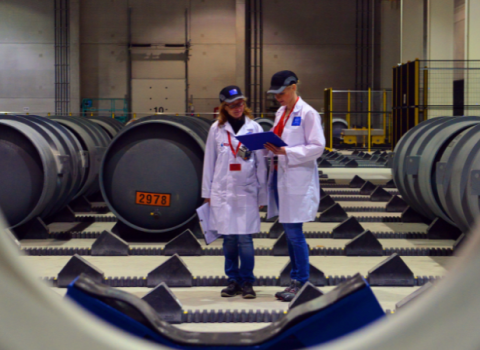A research consortium led by UCL academics has been awarded £8m by the Faraday Institution for groundbreaking research into energy storage.
The project – LiSTAR, Lithium-Sulfur Technology Accelerator – will run over four years and is one of five UK-based consortia focusing on industry-defined goals to improve performance of electric vehicles through working on battery chemistries, systems and manufacturing methods. It will be led by Professor Paul Shearing (UCL Chemical Engineering).
Working with six university partners and seven industrial partners, the project will work towards enabling rapid improvements in Lithium-sulphur (Li-S) technologies by generating new materials and engineering solutions through a focus on fundamental research at material and cell level, and an improved approach to system engineering.
Professor Shearing said: “Lithium-sulfur batteries are an exciting next generation battery technology with particular benefits associated with their gravimetric energy density, operating temperature window and the economics and sustainability of constituent materials.
“The LiSTAR programme will bring together a world leading group of researchers across academia and industry with a shared vision to accelerate the commercialisation of this technology.
“We have identified key early market opportunities that can catalyse the growth of the Li-S industry, for example aerospace applications which take advantage of this inherently light weight technology.”
Li-S is one of the most promising and mature alternative technologies to Lithium-ion available. Realising its potential would take batteries for automotive and other applications beyond the limitations of Lithium-ion chemistry.
The new projects have been awarded a total of £55m of funding. They are in four focus areas, joining the existing Faraday Institute research projects that collectively aim to deliver on the organisation’s mission to accelerate breakthroughs in energy storage technologies, boosting the UK in the global race to electrification and supporting the commercialisation of next-generation batteries.
Business Minister, Nadhim Zahawi, said: “Today’s funding backs scientists and innovators to collaborate on projects that will deliver a brighter, cleaner future on our roads. We are committed to ensuring that the UK is at the forefront of developing the battery technologies needed to achieve our aim for all cars and vans to be effectively zero emission by 2040.”
The overall project is part of the government’s Industrial Strategy Challenge Fund (ISCF), overseen by the Department for Business, Energy and Industrial Strategy to help transform the production of batteries for the future of electric vehicles (EVs) in the UK.
Neil Morris, CEO of the Faraday Institution, commented: “It is imperative that the UK takes a lead role in increasing the efficiency of energy storage as the world moves towards low carbon economies and seeks to switch to clean methods of energy production.
“Improvements in EV cost, range and longevity are desired by existing EV owners and those consumers looking to purchase an EV as their next or subsequent car. Improving this web of battery performance indicators (which differ for different sectors) is being researched, with a sense of urgency, by the Faraday Institution and its academic and industrial partners. Our fundamental research programmes are putting the UK at the forefront of this disruptive societal, environmental and economic change.”
The UCL-led consortium will be run by the Electrochemical Innovation Lab (EIL) which is home to over 70 researchers working across a range of electrochemical energy conversion and storage technologies.
During the course of the LiSTAR programme, researchers will establish a sister laboratory at UCL East – the Advanced Propulsion Lab – which will enable the team to build their fundamental understanding of the technologies and bring new processes to the commercial market.
This communication was first published 4 September 2019 by University College London





 A unique international forum for public research organisations and companies to connect their external engagement with strategic interests around their R&D system.
A unique international forum for public research organisations and companies to connect their external engagement with strategic interests around their R&D system.